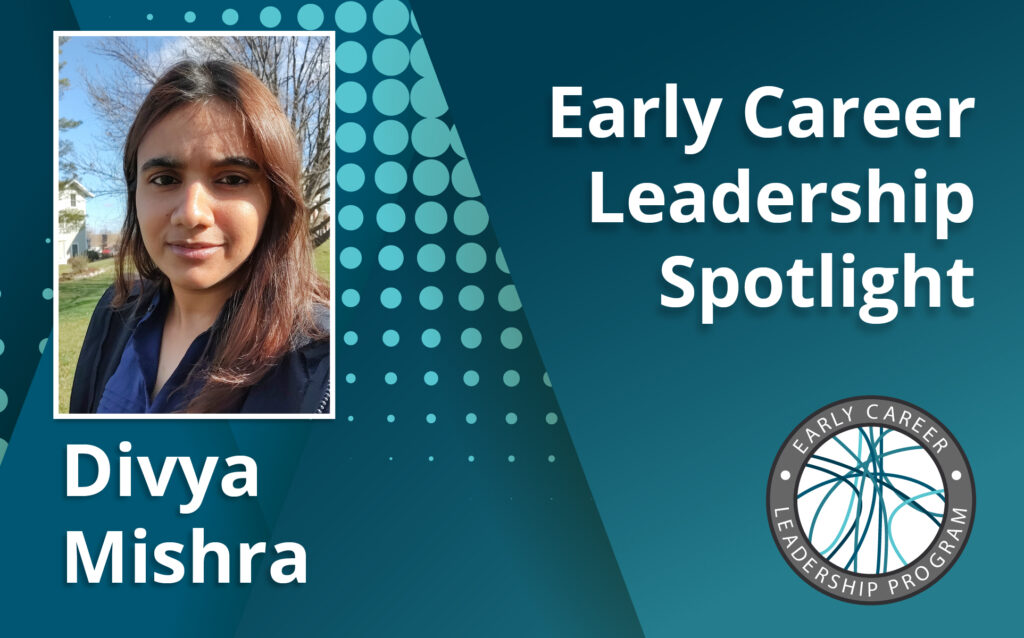We’re taking time to get to know the members of the GSA’s Early Career Scientist Committees. Join us to learn more about our early career scientist advocates.
Divya Mishra
Career Development Subcommittee
National Institute of Plant Genome Research, India
Research Interest
I have always been deeply curious about various aspects of life. This curiosity has continued to drive me along my scientific journey. I am fascinated by the dynamic interplay among various signaling pathways under stressful conditions. My research interest involves unraveling the intricate molecular mechanisms behind plants’ responses to harsh environments. I aspire to significantly contribute to an in-depth understanding of plant stress biology to generate climate-resilient crops with better yields. Stress-resilient crops are more likely to adapt to climate change, decrease food security, and be farmed sustainably. Collaborating with the scientific community, I hope to minimize global challenges, including food security and sustainability.
As a PhD-trained scientist, you have many career options. What interests you the most?
I recall the beginning of my PhD journey, a time when alternative career paths were not widely explored or considered mainstream. Nevertheless, the landscape has evolved, and individuals now leverage their PhD training to embark on different career trajectories. It’s crucial to acquire transferable skills during the PhD, skills that guide researchers in defining their future paths. I think career options are subjective to each individual because everyone has a different personality and capabilities. It is not easy to navigate the scientific journey to both understand what exactly we want and find a path for it in a competitive world.
I feel immense satisfaction from conducting experiments in the lab, feeling almost therapeutic. Throughout the scientific journey, it has been clear to me that I am a lifelong researcher, whether in academia, industry, or even pursuing my start-up ideas. The exploration in science keeps me engaged. Every day brings something new, often pushing the boundaries of how experiments are approached and sometimes uncovering cool things about them.
Equally, I love effectively communicating and presenting science to a wider audience, as I aim to enhance its accessibility and broader impact.
In addition to your research, how do you want to advance the scientific enterprise?
I believe in effectively communicating science to audiences beyond my research arena to bridge the gap between scientists, policymakers, and the rest of the public. I value providing people with the overview of what we are doing in the lab. I enjoy spreading knowledge and resources among my peers, as well as younger generations. I strongly encourage thinking outside of the box. It is so important to develop a scientific mindset that helps younger generations create hypotheses about science and life in general. Incorporating a course within the PhD curriculum that involves effective writing, hypothesis testing, scientific illustration, and data representation would benefit their PhD work and overall scientific journey.
I want to mentor and support aspiring scientists through my experiences. We are often unaware of the career choices in science; therefore, we need a support group for sharing knowledge. By doing this, we can surely make a better scientific community.
Another goal is to make the research workplace more inclusive so that we get opinions from a more diverse scientific community. I always feel that individuals from different backgrounds and experiences come with unique problem-solving approaches that could lead to effective, meaningful solutions. Inclusivity might help to reduce bias and stereotyping towards specific individuals in a working team. An amalgamation of diversity in the scientific community enhances the research quality and contributes to the development of a better society as a whole.
As a leader within the Genetics Society of America, what do you hope to accomplish?
As a leader in GSA, my aspirations align with enhancing the professional development program of the Career Development Subcommittee. The ECLP holds significance both for my own professional growth and for the empowerment of other early career researchers. Therefore, I am committed to raising awareness about this wonderful program among peers.
My main objective is to provide resources on career paths and trajectories. These resources are made up of workshops and written materials where field experts shed light on their experiences and accomplishments. The workshops and seminars could provide a platform for researchers to communicate, network, and collaborate with field experts.
For broader reach, I am determined to enhance the visibility of the ECLP and various events of the GSA by reaching out to interested individuals who can benefit from seminars organized by the Career Development Subcommittee. By harnessing the power of social media platforms, I will make the information from seminars and workshops available for global access and engagement. Knowledge becomes more valuable when shared with different people. That’s why it is essential to make the information available to everyone.
Previous leadership experience:
- Early Career Representative, Education Committee in American Society of Plant Biologist (2023-present)
- Social Media Editor, Crop Science Journal (January 2023-June 2023)
- Spotlight Editor, Physiologia Plantarum (2022-2023)
- Assistant Feature Editor, Plant Physiology (2021-2023)




